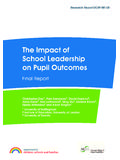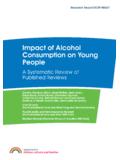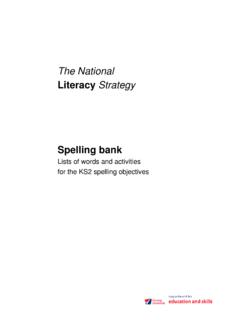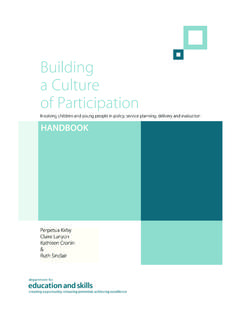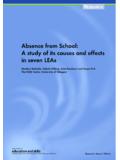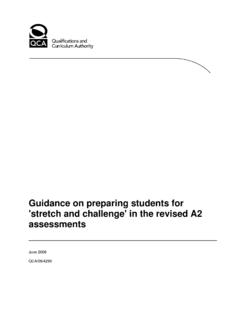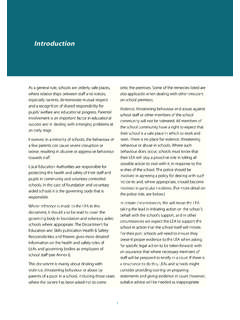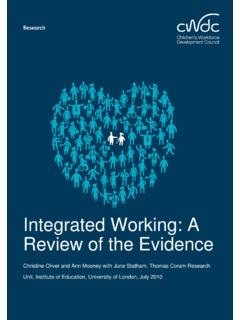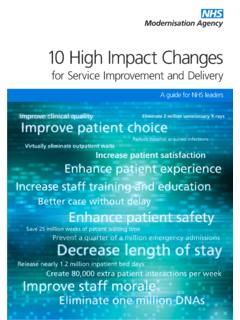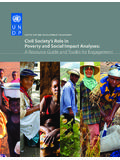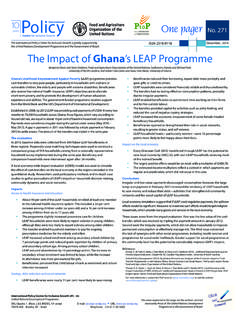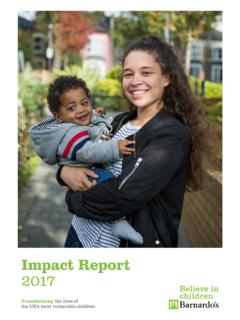Transcription of Impact of Family Breakdown on Children’s Well …
1 Impact of FamilyBreakdown on children s Well-BeingEvidence ReviewResearch Report DCSF-RR113 Ann Mooney, Chris Oliver and Marjorie SmithThomas Coram Research UnitInstitute of Education, University of LondonResearch Report No DCSF-RR113 Impact of Family Breakdown on children s Well-Being Evidence Review Ann Mooney, Chris Oliver and Marjorie Smith Thomas Coram Research Unit Institute of Education, University of London The views expressed in this report are the authors and do not necessarily reflect those of the Department for children , Schools and Families.
2 Institute of Education, University of London 2009 ISBN 978 1 84775 450 9 June 2009 Contents ii Executive 1 1. 4 The social and demographic Aims of the Methodology ..5 Structure of the 2. Family Breakdown and its Impact on 7 Differences in outcomes between children from intact and non-intact families ..7 Short-term and long-term effects ..8 Age and Differences between and within 3. Explanatory 10 Parental The quality of parenting and parent-child Maternal mental Socio-economic Repeated changes in Family 4.
3 Optimising positive child 14 children s perspectives on parental Facilitating children s adjustment to Family Services and 5. 21 Future Policy 24 i Acknowledgements We gratefully acknowledge the financial support of the Department for children , Schools and Families for this study, although the views expressed in this report are those of the authors and not necessarily those of the Department for children , Schools and Families. TCRU s Responsive Research Programme This study was carried out as part of the Thomas Coram Research Unit s programme of responsive research for the Department for children , Schools and Families.
4 This provides a facility for government policy makers to request small-scale, exploratory studies on issues of immediate policy relevance. Such work is carried out by experienced researchers in accordance with sound research principles. It is, however, important when reading and using reports from responsive programme studies to bear in mind the limited time and resources available for each piece of work. Responsive programme studies are particularly useful in bringing together diverse evidence, scoping a new field, and providing a basis for more substantive in-depth research where this appears to be necessary.
5 Ii Executive Summary Introduction Demographic and social changes in the last three decades have resulted in families that are more diverse and complex in their structure. More couples are cohabiting and becoming parents, though the risk of parental separation among this group is higher than among married parents; divorce rates have remained relatively constant and the number of stepfamilies is growing fast. children now have a higher probability of experiencing parental separation, having a lone parent, and being part of a stepfamily than was once the case.
6 The Impact this experience has on children is a key issue for policymakers since although the government wants to support stable relationships between parents, where they break down there is a responsibility to provide support to optimise positive outcomes for children . As a consequence, the Thomas Coram Research Unit, under the Department for children , Schools and Families (DCSF) funded responsive programme, was commissioned to undertake a review of the Impact of parental separation and divorce on children s well-being and development, to inform the PMSU / DCSF childhood project and policy development in this area.
7 The overall aim of the review was to highlight key findings concerning the antecedents, processes and sequelae of Family Breakdown and its Impact on children , while giving due weight to the complexities of the topic, the strength of the evidence (whether associative or causally linked) and any gaps in knowledge. Due to the limited time and resources available for the review it was agreed in consultation with the DCSF to draw primarily on review-level evidence rather than to undertake a systematic search for all relevant material.
8 Key texts were supplemented by others identified through a targeted search of bibliographic databases and internet searches. Family Breakdown and its Impact on children On a range of outcomes including educational achievement, behaviour, mental health, self-concept, social competence and long-term health, there are significant differences between children who experience parental separation compared with children from intact families. Although the difference between the two groups is generally statistically significant, effect sizes are nevertheless small, reflecting the fact that within both groups, children vary widely in their experiences.
9 children from intact families can experience circumstances known to increase the risk of poor outcomes such as poverty, parental conflict, violence and poor parenting, whilst children whose parents separate may not experience these or can cope well, with the result that many children experiencing Family Breakdown will function as well as, or even better than, children from intact families. While Family transitions place children at an increased risk of negative outcomes, the evidence shows that relatively few children and adolescents experience enduring problems, and some children can actually benefit when it brings to an end a harmful Family situation, for example where there are high levels of parental conflict, including violence.
10 Long-term effects in adults, who as children have experienced Family Breakdown , include problems with mental health and well-being, alcohol use, lower educational attainment and problems with relationships. There are significant differences within and across Family types, and simple comparisons between different Family types can mask much of the variation that exists. Stepfamilies, for example, vary enormously and living in a more complex stepfamily, where both parent and stepparent have brought children into the new Family has been associated with more adjustment problems than in a stepfamily where all the children are related to the mother.
